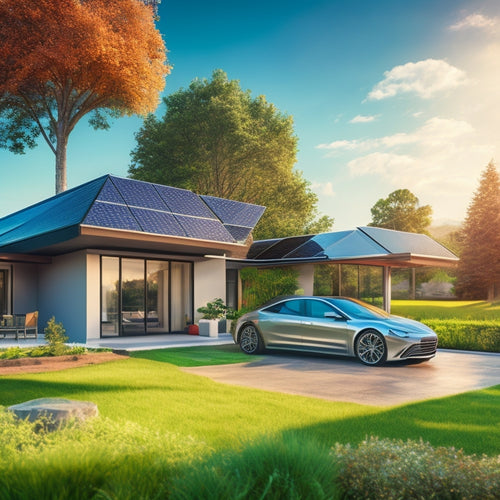
Essential Steps for Homeowners Going Green With Panels
Share
You're taking the first step towards reducing your carbon footprint and harnessing the power of renewable energy by installing solar panels on your home. To get started, assess your home's solar potential by analyzing your roof's orientation, direction, and surrounding landscape. Next, choose the right solar panels based on efficiency, durability, and warranty. Before installation, prepare your home by inspecting your roof, conducting an energy audit, and addressing energy-wasting areas. Then, install your solar panels and inverters, and finally, perform a thorough inspection and schedule routine maintenance. By following these essential steps, you'll be well on your way to harnessing the power of solar energy - and that's just the beginning.
Key Takeaways
• Assess your home's solar potential by analyzing roof orientation, direction, and shading to determine the ideal location for solar panels.
• Choose high-efficiency solar panels from reputable manufacturers, considering durability and warranty options to ensure long-term performance.
• Prepare your home for solar installation by inspecting and repairing your roof, conducting an energy audit, and optimizing energy efficiency.
• Install solar panels and inverters, selecting the right type of inverter and considering energy storage options to maximize energy production.
• Perform a final inspection and schedule routine maintenance to ensure the system functions correctly and efficiently over its lifespan.
Assessing Your Home's Solar Potential
How much solar energy can your home realistically harness, and what're the key factors that influence its solar potential?
When considering solar panels, it's vital to assess your home's solar potential. A roof orientation analysis will help determine the ideal angle and direction for your solar panels. This analysis takes into account the direction your roof faces, its slope, and the surrounding landscape.
Another important factor is the Shading factor assessment, which examines the impact of surrounding trees, buildings, and other obstructions on your solar panel's energy output. This assessment will help you identify the best location for your solar panels, minimizing energy loss due to shading.
By understanding these key factors, you'll be able to determine the maximum amount of solar energy your home can harness, making it easier to choose the right solar panel system for your needs.
Don't get left in the dark – assess your home's solar potential today and start harnessing the power of the sun!
Choosing the Right Solar Panels
Choosing the right solar panels for your home involves evaluating key factors, including efficiency, durability, and warranty, to guarantee you get the most out of your investment.
You want to make sure that your solar panels can convert sunlight into energy efficiently. Look for panels with high Panel Efficiency, usually above 20%. A higher efficiency rate means more power per hour of sunlight. Additionally, consider the durability of the panels, as they'll be exposed to the elements for years to come.
When it comes to warranty options, you'll want to select a manufacturer that stands behind their product. A thorough warranty can provide peace of mind and protect your investment.
Here's a comparison of popular solar panel brands:
| Brand | Panel Efficiency | Warranty Options |
|---|---|---|
| Tesla | 21.5% | 25-year performance, 10-year product warranty |
| Panasonic | 22.1% | 25-year performance, 10-year product warranty |
| SunPower | 22.8% | 25-year performance, 10-year product warranty |
| LG | 20.5% | 25-year performance, 10-year product warranty |
| Canadian Solar | 19.5% | 25-year performance, 10-year product warranty |
Pre-Installation Preparation Work
Before scheduling the installation, you'll need to make sure your home is ready for solar panels by tackling some essential pre-installation preparation work. Think of it as getting your home 'solar-ready'. This prep work is important to guarantee a smooth and successful installation.
First, you'll need to schedule a roof inspection to identify any potential issues that could impact the installation. This is the perfect opportunity to fix any damaged or missing shingles, and make sure your roof is structurally sound. You wouldn't want your shiny new solar panels to be compromised by a leaky roof, would you?
Next, consider an energy audit to identify areas in your home where energy is being wasted. This will help you pinpoint opportunities to improve your home's energy efficiency, making your solar panels even more effective. By addressing these energy-sucking culprits, you'll maximize the benefits of your new solar panels and save even more green (both environmentally and financially!).
Installing Solar Panels and Inverters
With your home now solar-ready, it's time to install the solar panels and inverters that will convert sunlight into usable electricity. You've got two main mounting options: roof-mounted or ground-mounted systems. Roof-mounted systems are the most common, but if you've got a large yard, ground-mounted systems can be a great option. Make sure to choose the mounting option that suits your roof type and energy needs.
Next, it's time to install the inverters, which convert DC power from the solar panels into AC power for your home. You'll need to decide on the inverter type: string inverters, microinverters, or power optimizers. String inverters are the most common, but microinverters offer more flexibility and monitoring capabilities.
Don't forget about energy storage! If you want to store excess energy generated during the day for nighttime use, consider installing a battery storage system. This will help you power your home even when the sun goes down.
With your solar panels and inverters installed, you're one step closer to harnessing the power of the sun and reducing your carbon footprint.
Final Inspection and Maintenance
You're ready to perform a final inspection to make sure your solar panel system is installed correctly and functioning as expected. This is your last chance to catch any mistakes or issues before you start generating clean energy.
Take a walk around your property to guarantee all components, including panels and inverters, are securely fastened and properly connected. Check for any signs of wear or damage, and verify that all electrical connections are secure. Double-check that your system is producing energy efficiently, and review your monitoring system to make sure it's tracking your energy production accurately.
Regular maintenance is essential to optimize your system's energy efficiency and extend its lifespan. Schedule routine inspections to catch potential issues before they become major problems. Keep in mind that neglecting maintenance may void your warranty, which typically expires after a certain period.
Stay on top of maintenance to ensure your system runs smoothly and efficiently, and you'll be enjoying the benefits of renewable energy for years to come. By doing so, you'll maximize your energy savings and reduce your carbon footprint.
Frequently Asked Questions
Can I Install Solar Panels on a Rented Property?
As a renter, you're probably wondering if you can install solar panels on your rented roof. Sorry, buddy, but you'll need your landlord's permission, as it's their property. Check your renter's rights, but don't get your hopes up!
Will Solar Panels Increase My Property's Value?
You'll be thrilled to know that installing solar panels can boost your property's value! According to property appraisals, homes with energy-efficient features like solar panels see increased home resale values, aligning with current market trends in real estate.
Do Solar Panels Work During a Power Outage?
During a power outage, your solar panels won't provide power unless you have an Emergency backup system, ensuring grid resilience; without it, you'll be stuck in the dark, wishing you'd invested in that backup plan, buddy!
Can I Install Solar Panels Myself to Save Money?
If you're considering installing solar panels yourself to save money, beware of DIY challenges, safety risks, and tool requirements that demand high skill levels, making accurate cost calculations a challenging task.
Are Solar Panels Recyclable at the End of Their Life?
You're wondering if solar panels are recyclable at the end of their life? Good news: most panel manufacturers have recycling programs, minimizing environmental impact, and you can even get some cash back through panel recycling programs!
Related Posts
-

What Solar Panels Work Best With EVS Online?
When shopping for solar panels online to power your electric vehicle, look for high-efficiency models that can withst...
-

Eco-Friendly Car Battery Solutions Available Online
You can now shop online for eco-friendly car battery solutions that not only reduce your carbon footprint but also of...
-

Charging Station Incentives: Why So Many Are Free
You're likely to stumble upon free or low-cost charging stations due to a convergence of incentives. Government rebat...


